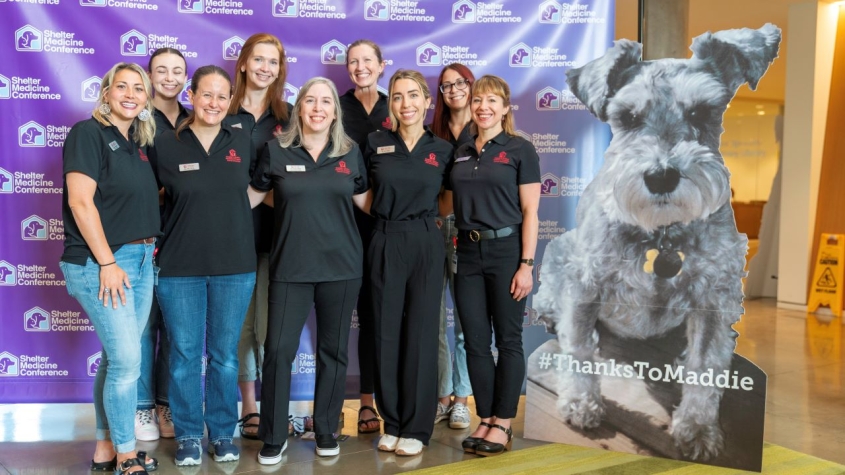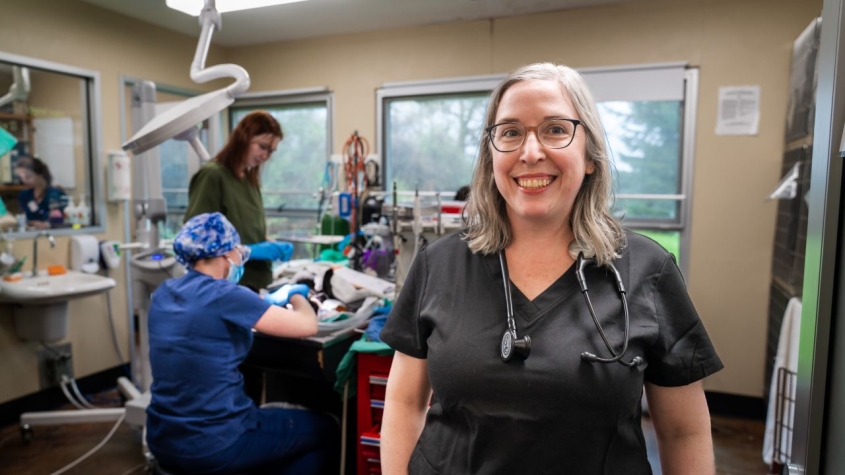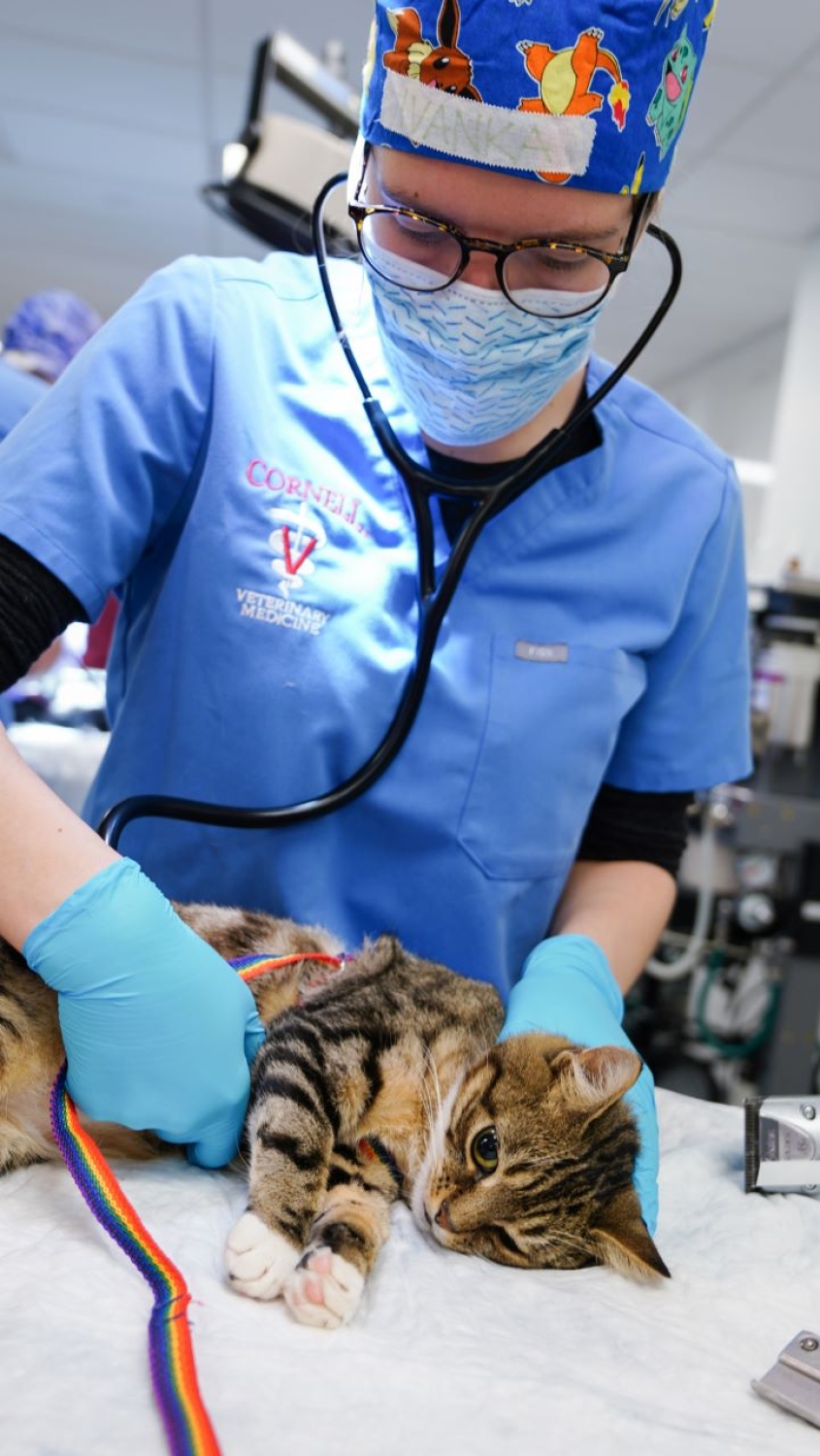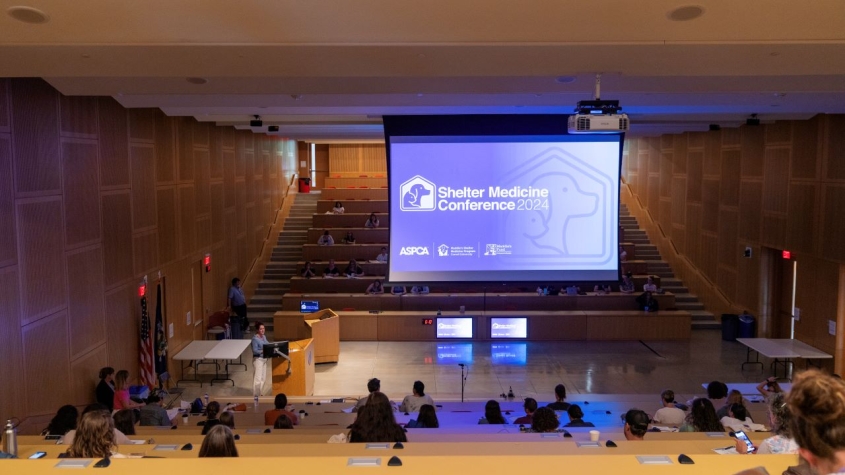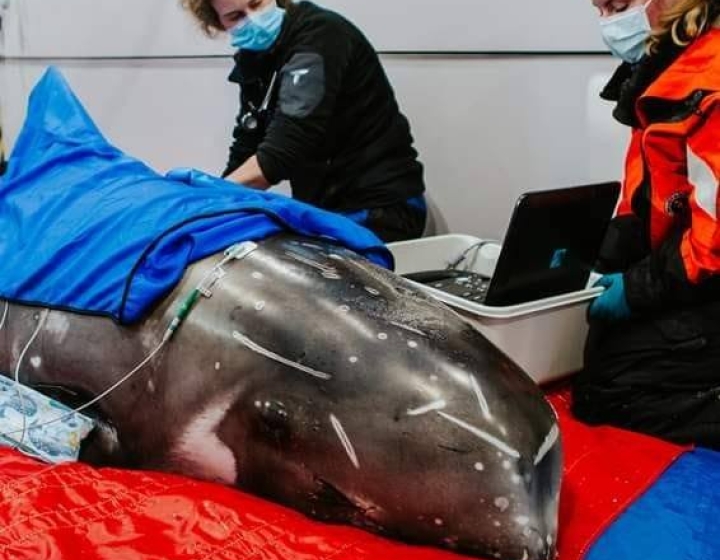New $4.6 million grant expands Cornell Maddie’s® Shelter Medicine Program
Maddie’s Fund® is a national family foundation established by Dave Duffield ’62, MBA ’64, and Cheryl Duffield to revolutionize the status and well-being of companion animals. The foundation, dedicated to pioneering shelter medicine education and innovative access to care initiatives for the past thirty years, has awarded the Maddie’s® Shelter Medicine Program (MSMP) at Cornell University a new $4.6 million grant to sustain and grow its work over the next five years.
This grant builds on two decades of steady support from Maddie’s Fund that has helped place the MSMP as a leader in its field — from establishing the first didactic course in shelter medicine, to setting industry standards on health protocols, to training hundreds of shelter medicine veterinary professionals across the world.
Now, thanks to the renewed funding, the program is poised to widen its impact in New York State and beyond, increasing the reach of shelter medicine and improving access to care.
New leadership
At the helm of the MSMP is Jessica Reed, D.V.M. ’12, who returned to Cornell to become the Janet L. Swanson Director in April 2024. Previously, interim director Dr. Lena DeTar guided the program for two years after former program head, Elizbeth Berliner, D.V.M. ’03, departed to serve as senior director of shelter medicine at the ASPCA.
Reed is no stranger to shelter medicine at Cornell having been mentored by Dr. Janet Scarlett, the founding director of the MSMP, and Berliner as a veterinary student. “I discovered, and fell in love with, shelter medicine while I was a vet student,” says Reed. After graduation, and a few years working in general practice, Reed landed at Seattle Humane where she held various leadership roles, taught fourth-year veterinary students, started an internship program and launched a community medicine project.
When the opening for the MSMP director position was announced at Cornell, Reed saw it as a special opportunity to have a significant impact on the field. “I think students need to understand, and witness, that there are many ways to practice veterinary medicine and many ways to care for animals,” says Reed. “The MSMP offers opportunities for students to think about the widest spectrum of care possible for clients and pets and how they will address that as a practitioner, even if they don’t end up as shelter vets. We all want the best for our patients, and we want them to remain in their loving homes whenever possible.”
New funding
That impact just received a significant boost thanks to the grant award from Maddie’s Fund. In addition to continued support of the MSMP’s current faculty and staff, the funding will allow recruitment of several new faculty and staff, all focused on increasing access to veterinary care. The funds will also drive more research focused on shelter medicine and epidemiology.
The support will also help the program expand its approaches to teaching and clinical “access-to-care,” an effort now widely embraced in the veterinary field to describe the direct efforts underway to address limitations pet owners may have – financial or otherwise – to provide their pets with the consistent care they need. With the new funds, the MSMP will work to establish itself as a model for applying an access-to-care lens to teaching, clinical service and outreach, and will partner with the Cornell University Hospital for Animals and its veterinary social worker to serve clients in need.
All this builds on decades of support from Maddie’s Fund in helping Cornell establish a robust and exemplary shelter medicine program. “Thanks to Maddie’s Fund’s partnership and investments at Cornell and other institutions, animals’ lives are being saved in greater numbers year over year,” says Lorin D. Warnick, D.V.M., Ph.D. ’94, the Austin O. Hooey Dean of Veterinary Medicine. “At the same time, better integrated care and population management is being provided, more community clinicians are being educated and increasing numbers of veterinarians are inspired to enter shelter medicine practice and embody its principles. All this constitutes as an impressive success story inspired by the vision of Dave and Cheryl Duffield and Maddie’s Fund.”
As champions of animal well-being, Maddie’s Fund is committed to sustaining and expanding these successes they helped launch. “Our goals are aimed at keeping pets and people together and creating a safety net of care for animals in need,” says Laurie Peek, D.V.M., ’96, Maddie’s Fund Executive Leadership Team. “Through their training, service and research, the Cornell Maddie’s® Shelter Medicine Program is fulfilling that promise. We are excited to continue to support this work, and help it grow and thrive.”
Expanding access to care
A key goal of the renewed funding will be to help the MSMP expand its access-to-care initiatives. According to the Access to Veterinary Care Coalition, the lack of access to veterinary care is a complex societal problem with many causes, including socioeconomic factors, geography, language, transportation and more.
The access-to-care topic was highlighted at this summer’s Maddie’s® Shelter Medicine Conference during the keynote address as well as in several workshops and sessions. “There is not yet one solution, but people are approaching these challenges from the diverse array of angles they require,” Reed says.
Shelter clinicians and staff routinely deal with the fallout of access-to-care problems. “Not having money to treat medical issues is a significant challenge during intake,” says DeTar. “There is no government assistance for pet owners, and most shelters are not set up to provide emergency services. Unless other clinics and emergency departments get more grant money of their own or figure out another system of reimbursement, it will still fall to the least-resourced organizations in the community to do this – shelters – because it’s part of our mission to help everyone.”
At veterinary practices, the issue can result in truly devastating results. Reed recounts a case of a kitten with a broken bone that had to be euthanized because its owners couldn’t afford to repair it. “No one wants that outcome, but this is something that happens every day,” says Reed. “It’s a very complicated problem, but if there’s any place in that pathway where we can intervene to prevent it, we want to try.”
Reed says part of those interventions can include providing veterinary students with “spectrum-of-care” training, which empowers practitioners to engage in a dialog with their clients and ensure that all care options are being provided. This approach often adds focus, and removes stigma from, more cost-effective interventions and preventative measures that can help pets avoid larger medical costs in the future.
“There’s so much need everywhere,” says Reed. “We just have to point ourselves at a problem and get to work.” With the continued generosity from Maddie’s Fund, that’s just what the Maddie’s® Shelter Medicine Program will do.
Written by Lauren Cahoon Roberts



